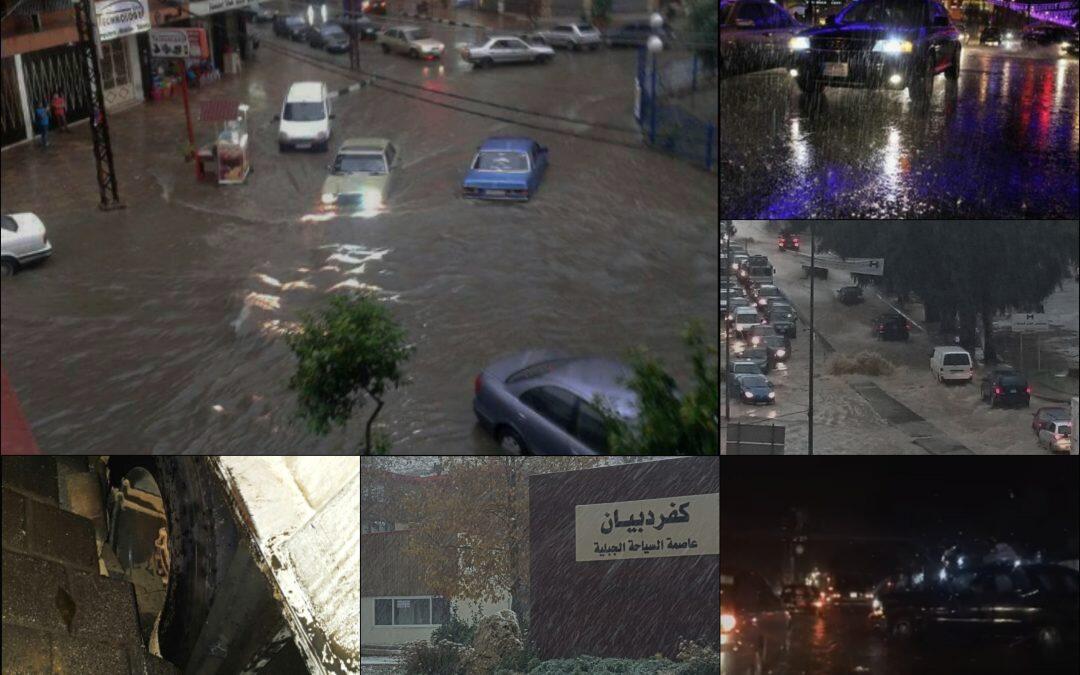Social media pages in Lebanon were bombarded with pictures and videos showing the negative effects that came with the first rain on Lebanon’s streets, and this is what happens every year actually. While some people published videos revealing cars that are about to drown in the rain, others published photos and videos of roads that just need a bit of time to be destroyed. We contacted the Lebanese Minister of Public Works and transport Ghazi Zaiter, to be informed of the ministry’s preparations before the first rain, and before storm “Barbara” reaches the country.
Throughout the phone interview with “greenarea.info”, Zaiter confirmed that “The Ministry of public works is not responsible for roads inside Beirut, and it does not run away from its responsibly”. He added: “We are responsible for the “international” highways: North- Beirut, Bekaa-Beirut, Beirut – South, and Bekaa- southern border. The internal roads in Beirut in which streams of rain closed, are not our responsibility, but the responsibility of the municipalities. ”
However, he said that the ministry “is ready to help in any task that is not included in its responsibilities, if it had the resources to do so”. On the other hand, Zaiter said: “We are ready for the storm “Barbara”, and we will open the international highways as soon as possible, in case of snow accumulation”.
After watching the videos revealing the drastic situation of Beirut’s roads, we tried phone calling the Governor of Beirut Ziad Chebib, but there was no answer.
Municipalities of the southern suburbs ready
The situation of the roads in the southern suburbs of Beirut, was not as tragic as in previous years. We contacted the head of the “Union of Municipalities of the southern suburbs,” Mohammad Dergham, who said that “the credit for the improvement of road conditions during the rainy season goes to the emergencies program in the Suburbs’ municipalities,” adding, “We are following up on the work of the municipalities.”
He attributed the cause of poor road conditions in the previous year to the accumulation of wastes in the streets. He also said that “suburbs’ municipalities make sure that the roads which are the responsible of the Ministry of Works, but which are located within the suburbs, do not suffer from any problems as well, and he gave the example of the airport road.”
In response to our question about how long will the excavations continue in the region, especially that they might lead to worsening road conditions during the rain, he said, “The excavations will continue, but at a slower pace in the winter season, and they are basically excavation works that fall within a two-year strategic plan for water in the southern suburbs”. He explained that this project, in which works in the southern suburbs are taking place at the moment to continue its networks, belongs to Bisri dam.
Governor of the South: to move quickly upon any emergency
On the other hand, the governor of the South Mansour Daou followed up on the readiness of the departments and state agencies in the south, in order to counter the effects of the storm hitting Lebanon.
He called on the Disaster Management Committee to make sure they are prepared for winter emergencies, and he listened to other state agencies’ concerns, to keep abreast of any new connection with the storm.
He also contacted a number of heads of heads of municipalities in the south for the same purpose, urging them to “take all necessary measures to move quickly upon any emergency, or to inform the governorate if necessary.”
Cars stuck in the north
In the north, however, water gathered in Tripoli’s streets, due to heavy rains, particularly in the Abi Samra district, where cars were stuck in the arena, which has turned into a pond, causing traffic in various parts of the city, according to “NNA”. The agency added that residents asked the municipality to work on opening water lanes to facilitate traffic flow. In Bab Tabbaneh, -Beraniyeh, floods and heavy rains turned the streets into pools.











